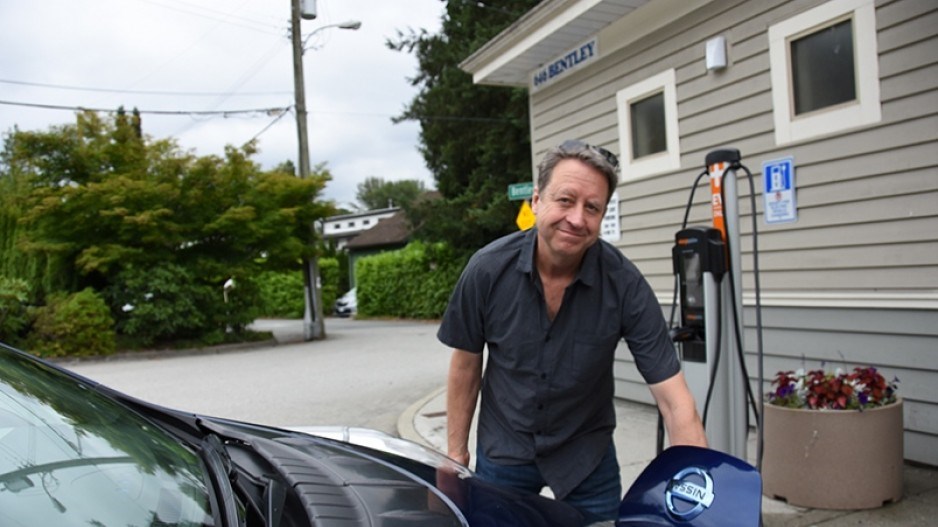Live in a condo or townhouse? Want to switch to an electric vehicle (EV)?
It might not be as simple as just trading in your gas-powered car.
Older condo complexes will find it difficult to accommodate electric vehicle charging stations without an expensive electric upgrade.
And EV buyers will need signed letters of accommodation before purchasing a unit, warns the Condominium Home Owners Association (CHOA).
While Port Moody, Port Coquitlam and Coquitlam now require rough-ins for Level 2 or higher electric vehicle charging for all new units, older buildings and even newer apartments that were built before the new regulations were in place may not have have electric vehicle charging — or the capacity to install it.
And while it isn’t impossible to retrofit to accommodate electric vehicles, it is challenging, says Tony Gioventu, CHOA’s executive director.
“It can be a big part of modernizing buildings,” Gioventu said.
The cost of upgrading electrical capacity to handle the extra load can cost as much as $100,000 or more, an investment owners of older buildings may not want to consider, especially for just one or two EV owners.
But there are ways around this challenge, according to Gioventu.
He said hIs strata started by spending approximately $45,000 to upgrade to energy-saving LED lighting, which is saving building owners approximately $56,000 a year in utility fees at the same time as freeing up electrical capacity for six 240-volt electric car charging stations.
“Some buildings are making modifications and are allowing electric car charging stations,” said Gioventu, who pointed out that LED lighting is not only cheaper but provides for greater visibility in parkades and stairwells while emission-free and noise-free EVs can enhance livability in underground parking lots.
Gioventu said there are ways to deal with some of the costs of upgrades, but councils need to explore their options, and it’s important for condo owners wishing to purchase EVs to first make sure they have a place to charge their vehicle.
A green decision
One Port Moody driver has found a work around that satisfied his strata council and enabled him to purchase a low-mileage 2016 Nissan Leaf.
Bob Shield noticed he had a 110 volt plug — suitable for trickle charging — at his parking stall in a condo at Newport Village, and wrote his strata council asking for permission to use it to power an electric vehicle.
It was agreed he pay a monthly $30 fee to use the outlet to charge his electric vehicle, and with many strategically placed ChargePoint chargers in the city for additional top up, and an employer willing to install chargers, Shield decided to go forward and purchase his car.
“Budget wise and need wise I’m sure it will fit the bill,” Shield told The Tri-City News.
He acknowledged, however, that he was lucky the strata council agreed to the idea of using the outlet at his stall — another EV driver in the building has a similar deal — making it possible for him to give up his older Toyota gas guzzler.
Get confirmation in writing
But not all stratas are willing to make changes and investments necessary, said Gioventu, so it’s important that buyers get in writing whether electric car charging will be allowed.
“People who are buying into condos with electric vehicles without first checking whether their building has a station or can get a station — or they’re living in a condo and they go out and purchase an electric vehicle — and they’re being told by whoever sold them the vehicle the strata has to put in a charging station, that’s not true, [stratas] don’t have to put in a charging station,” Gioventu said.
In fact, for many older condo complexes, it can be cost-prohibitive to put in charging stations because of the requirement to upgrade electrical capacity to handle the extra load.
“It’s one of those things where technology has outpaced our building systems," he said.
On the other hand, some apartment residents see EVs as the way of the future and new regulations have made it possible for strata corporations to charge a user fee for the utility for the electric service and the long-term capital cost.
“They can set a bylaw or a rule that has a user fee attached to it and the user fee charges for reasonable consumption and a surcharge fee for the eventual costs of what the upgrades will be. They don’t have to pay for this overnight.”
Gioventu said he knows of apartments in New Westminster and Burnaby where residents found the investment was reasonable given a longer payback.
“I think the complications are electrical capacity in the building and the modifications that have to be done,” he said
And while some stratas may not want to accommodate the changes now, they may be more willing to do so in the future as regulations, enforcement, incentives and a cultural shift make it more feasible to make the switch to EV cars in the years to come.




